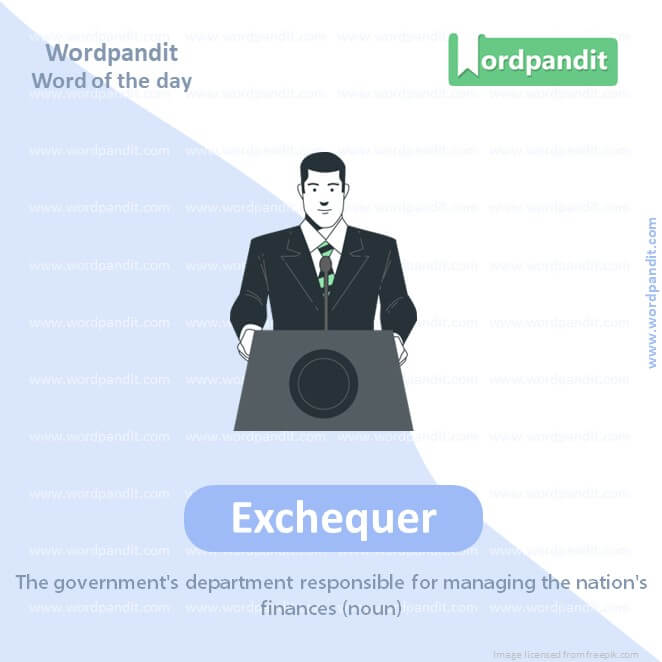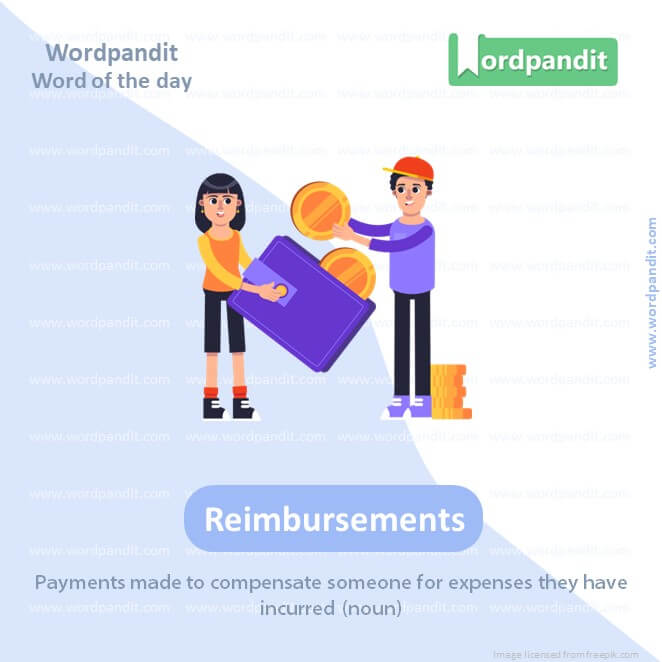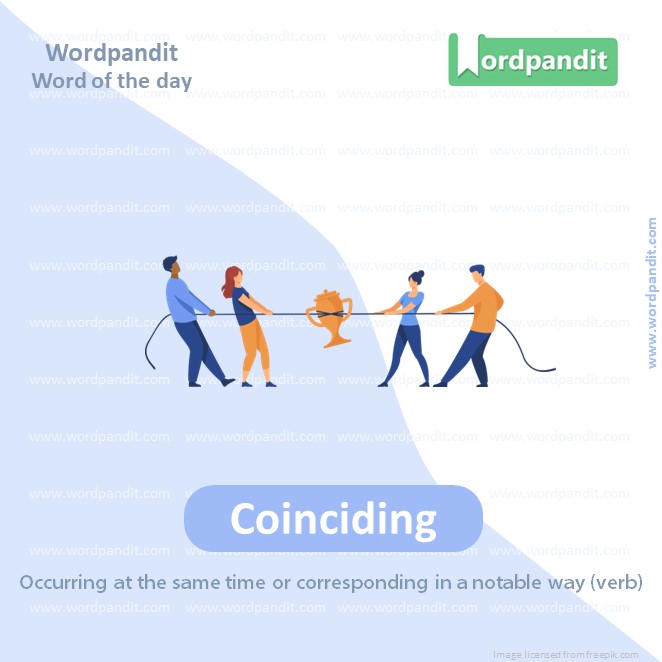Daily Vocabulary Words: List of Daily Used Words in Leading Indian Newspapers
Hi there. Welcome to this special section @ Wordpandit. Our endeavour here is straightforward: highlighting daily vocabulary words that you would come across in leading newspapers in the country. We have included the following newspapers in our selection:
• The Times of India
• The Economic Times
• Hindustan Times
• Mint
• Indian Express
We are putting in extensive work to develop your vocabulary. All you have to do is be regular with this section and check out this post daily. This is your repository of commonly used words; essentially, we are posting a list of daily used words. Hence, this has significant practical application as it teaches you words that are commonly used in leading publications mentioned above.
Visit the website daily to learn words from leading Indian newspapers.
WORD-1: Anguish
CONTEXT: The Prime Minister’s anguish over the Supreme Court declaring electoral bonds unconstitutional and the consequences of this decision needs to be considered seriously and with a broad perspective.
SOURCE: Indian express
EXPLANATORY PARAGRAPH: Anguish is a feeling inside you that makes you very sad and hurts your heart. It’s like when you lose your favorite toy or when you miss someone you love very much.
MEANING: A feeling of extreme sadness or suffering (noun).
PRONUNCIATION: ANG-gwish
SYNONYMS: agony, torment, distress, sorrow, misery
USAGE EXAMPLE:
1. She felt a deep sense of anguish when her pet ran away.
2. The family experienced anguish when they heard the news of the accident.
3. He was in anguish after failing his exam.
4. The mother’s face showed anguish when she couldn’t find her lost child.

WORD-2: Exchequer
CONTEXT: There are two ways for the NEF to receive money: Grants directly from the national exchequer, or donations by corporate and other donors.
SOURCE: Indian express
EXPLANATORY PARAGRAPH: Imagine a big, magical box where all the money of a kingdom is kept safe. That magical box is called an exchequer. It’s like a treasure chest where the king or queen keeps all the gold and silver coins.
MEANING: The government’s department responsible for managing the nation’s finances (noun)
PRONUNCIATION: EKS-chek-er
SYNONYMS: treasury, coffers, funds, vault, reserve
USAGE EXAMPLE:
1. The exchequer was full of gold coins collected from taxes.
2. The chancellor of the exchequer manages the finances of the country.
3. The exchequer was used to fund the construction of new roads.
4. The king ordered the exchequer to be opened to pay for the war.

WORD-3: Reimbursements
CONTEXT: Since the number of votes polled cannot be fudged, reimbursement based on polled votes would be accurate.
SOURCE: Indian express
EXPLANATORY PARAGRAPH: Reimbursement is like when you borrow a toy from a friend and promise to give it back. When you return the toy, you might also give your friend a new toy or something else to say thank you. That’s called reimbursement. It’s giving back something to make up for what you borrowed.
MEANING: Payments made to compensate someone for expenses they have
incurred (noun).
PRONUNCIATION: ree-IM-burs-muhnts
SYNONYMS: compensation, repayment, refund, restitution, indemnification
USAGE EXAMPLE:
1. The company promised reimbursement for any travel expenses incurred during business trips.
2. After the accident, the insurance company provided reimbursement for the damages to the car.
3. She submitted the receipts for reimbursement of the medical expenses.
4. The airline offered reimbursement for the cancelled flights due to bad weather.

WORD-4: Extortion
CONTEXT: This scheme meets all the requirements of honesty — no extortion, no bribes, no quid pro quo.
SOURCE: Indian express
EXPLANATORY PARAGRAPH: Imagine if someone takes your favorite toy and says they won’t give it back unless you give them your snacks. That’s called extortion. It’s when someone forces you to give them something you have by making threats or using fear.
MEANING: The practice of obtaining something, especi ally money, through
force or threats.
PRONUNCIATION: ik-STAWR-shuhn
SYNONYMS: blackmail, coercion, intimidation, shakedown, racket
USAGE EXAMPLE:
1. The criminal was arrested for extortion after threatening the shop owner.
2. The gang engaged in extortion by demanding protection money from local businesses.
3. She refused to give in to extortion and reported it to the authorities.
4. The extortionist demanded a large sum of money in exchange for not harming the family.
WORD-5: Intimation
CONTEXT: Donors who are keen to fund a political party and do not fear “reprisals” may still do so, but strictly by cheque and under intimation to the ECI, as has been the practice.
SOURCE: Indian express
EXPLANATORY PARAGRAPH: Intimation is like when someone whispers a secret in your ear, and you’re the only one who knows it. It’s a little hint or clue that tells you something without saying it directly, like a secret message just for you.
MEANING: An indirect or subtle suggestion or hint about something (noun).
PRONUNCIATION: in-tuh-MEY-shuhn
SYNONYMS: suggestion, hint, clue, insinuation, indication
USAGE EXAMPLE:
1. There was an intimation that changes would be made to the project.
2. She gave him an intimation of her feelings through a glance.
3. The letter contained an intimation of the upcoming event.
4. His smile was an intimation of his approval.
WORD-6: Heinous
CONTEXT: the ECI’s proposal to legally empower it to cancel elections where credible evidence of abuse of money is found. Five, debar from contesting elections persons against whom cases of heinous offences are pending in courts.
SOURCE: Indian express
EXPLANATORY PARAGRAPH: Imagine if someone did something very, very bad, like stealing all the cookies from the cookie jar and blaming it on someone else. That’s called heinous. It’s when someone does something extremely wrong and hurtful.
MEANING: Extremely wicked or shockingly evil (adjective).
PRONUNCIATION: HAY-nuhs
SYNONYMS: atrocious, monstrous, abominable, despicable, vile
USAGE EXAMPLE:
1. The serial killer committed heinous crimes that shocked the community.
2. The dictator was known for his heinous acts against humanity.
3. She couldn’t believe the heinous lies spread about her.
4. The judge described the crime as heinous and sentenced the criminal to life in prison.

WORD-7: Coinciding
CONTEXT: The election campaign is again, poignantly, coinciding with Ram Navami celebrations.
SOURCE: Indian express
EXPLANATORY PARAGRAPH: Coinciding is when two things happen at the same time, like if you and your friend both decide to wear the same color shirt without planning it. It’s like having the same idea or doing something together without meaning to.
MEANING: Occurring at the same time or corresponding in a notable way (verb).
PRONUNCIATION: koh-in-SAHY-ding
SYNONYMS: simultaneous, concurrent, concurring, parallel, synchronous
USAGE EXAMPLE:
1. Her birthday coinciding with the holiday made for a double celebration.
2. The meeting was rescheduled due to coinciding events.
3. Their goals were coinciding, so they decided to work together.
4. The two cars collided at the intersection, coinciding with heavy traffic.
WORD-8: Poignantly
CONTEXT: The election campaign is again, poignantly, coinciding with Ram Navami celebrations.
SOURCE: Indian express
EXPLANATORY PARAGRAPH: Poignantly is like when you watch a sad movie, and it makes you cry because it reminds you of a time when you felt very lonely. It’s when something touches your heart and makes you feel strong emotions, like sadness or happiness, very deeply.
MEANING: In a profoundly moving or touching manner (adverb).
PRONUNCIATION: POIN-yuhnt-lee
SYNONYMS: emotionally, deeply, profoundly, movingly, touching
USAGE EXAMPLE:
1. The movie ended poignantly with a heartfelt message.
2. She spoke poignantly about her struggles and triumphs.
3. The poem was written poignantly, evoking strong emotions in the readers.
4. The memorial service was filled with poignantly shared memories.

WORD-9: Exiled
CONTEXT: The most obvious is that of the exiled prince of Ayodhya, standing barefoot with no armour and only a bow and arrow as a weapon.
SOURCE: Indian express
EXPLANATORY PARAGRAPH: Exiled is when someone has to leave their home and go live in another place far away, like if you had to move to a new town where you didn’t know anyone. It’s like being sent away from where you belong and having to start over somewhere else.
MEANING: Forced to leave one’s country or home, often by official decree (verb).
PRONUNCIATION: EGZ-ahyld
SYNONYMS: banished, expelled, deported, ostracized, displaced
USAGE EXAMPLE:
1. The king exiled the traitor from the kingdom.
2. After the revolution, many aristocrats were exiled from the country.
3. She felt lonely and homesick while living in exile.
4. The political dissident was exiled for speaking out against the government.
WORD-10: Arsenal
CONTEXT: Facing him is the mighty King of Lanka on a massive chariot and a huge arsenal of weapons.
SOURCE: Indian express
EXPLANATORY PARAGRAPH: Imagine a superhero who has a special belt with all kinds of gadgets like a grappling hook and smoke bombs. That superhero’s belt is like their arsenal, a collection of weapons or tools they use to fight against bad guys. It’s like having a secret stash of things to help you when you need them.
MEANING: A collection of weapons and military equipment (noun).
PRONUNCIATION: AHR-suh-nl
SYNONYMS: armory, stockpile, cache, weaponry, munitions
USAGE EXAMPLE:
1. The army’s arsenal included rifles, tanks, and missiles.
2. The detective searched the criminal’s arsenal for evidence.
3. She built up her arsenal of skills to prepare for the competition.
4. The country’s nuclear arsenal posed a threat to its neighbors.
Vocabulary Daily Words
Among the myriad aspects of language learning, the role of ‘vocabulary daily words’ attests to their undeniable importance. These everyday words form the bedrock of communication. Whether used in casual chat or formal discussion, the fluency and understanding of ‘vocabulary daily words’ can significantly uplift the quality of interaction. However, the vital question is, how to effectively learn these ‘vocabulary daily words’?
The crux of learning ‘vocabulary daily words’ lies in a well-rounded approach that encompasses exposure, understanding, memorization, and practice. Rote memorization might seem like a quick solution, but it lacks context and, thereby, retention. Hence, opt for a diverse range of resources like books, newspapers, podcasts, and digital media. These will bring ‘vocabulary daily words’ to life, providing real-life usage examples and making the learning process inherently engaging.
Next, using memory-enhancing techniques can significantly improve retention of ‘vocabulary daily words’. Techniques such as flashcards or the Leitner System align with the principles of spaced repetition, allowing more effective and long-term learning. Incorporating mnemonic devices, associating new words with unique stories or images, can further facilitate this learning process.
The key to fully grasping ‘vocabulary daily words’ lies in practical usage. Make it a habit to use these words in your daily communications. Whether it’s a friendly conversation, a professional email, or a social media post, try integrating these new words. Doing so provides hands-on practice, strengthening your comprehension and application of these words.
In a nutshell, ‘vocabulary daily words’ are a treasure in the language learning landscape. By harnessing diversified resources, utilizing memory techniques, and actively using these words, your grip on the ‘vocabulary daily words’ will strengthen significantly. So, turn the pages, hit play, start a conversation, and let these ‘vocabulary daily words’ shape the story of your linguistic journey.













